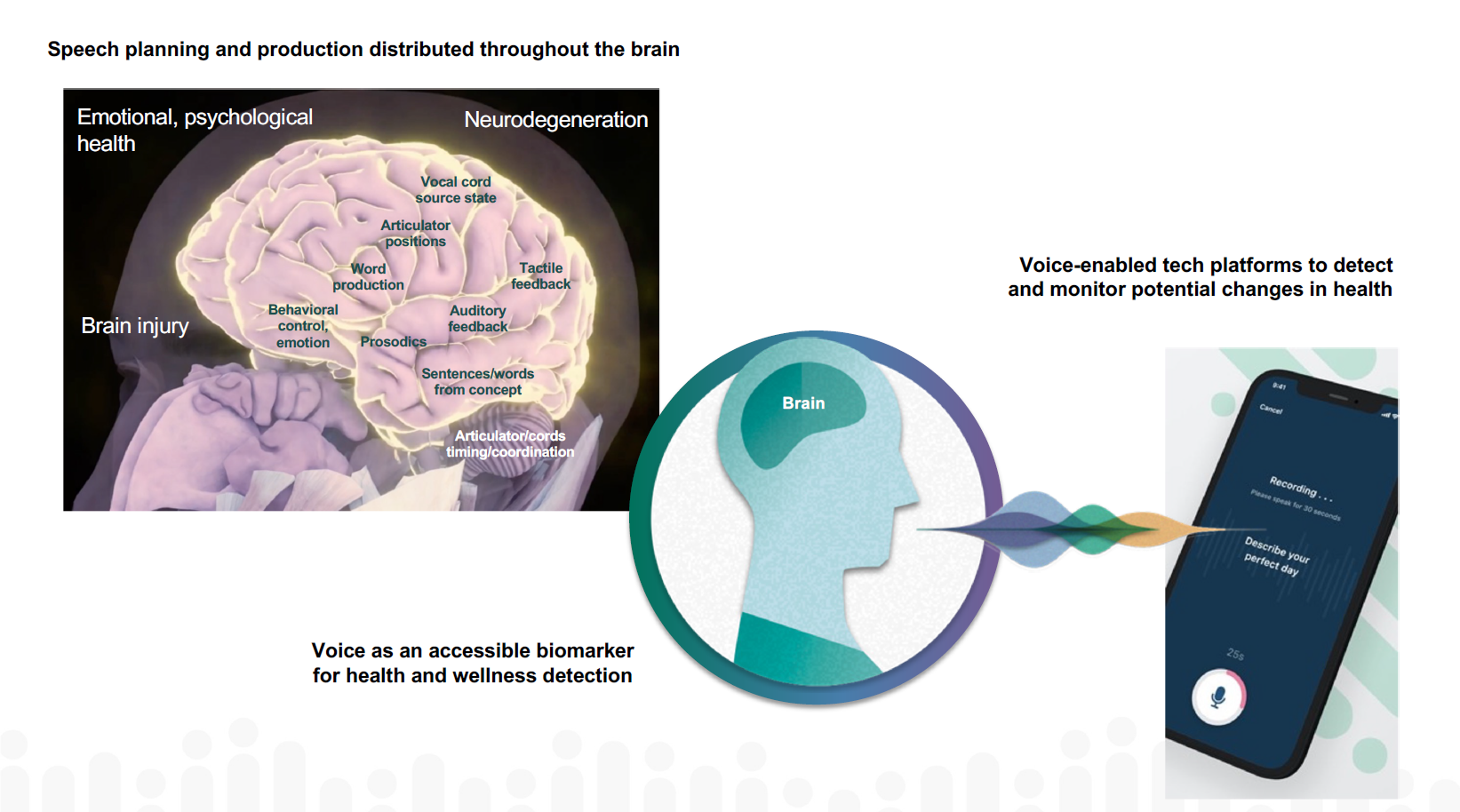Investigators:
Erik Larsen, Sonde Health
Brad Dickerson, Massachusetts General Hospital
Bonnie Wong, Massachusetts General Hospital
MassAITC Cohort: Year 1 (AD/ADRD)

Final Project Accomplishments: The pilot project, conducted by researchers from Massachusetts General Hospital and Sonde Health, explored the use of a vocal biomarker platform to detect and monitor cognitive impairment in older adults. Over the course of the study, 54 participants were enrolled and asked to complete voice-based tasks using a mobile app in their home environments. The platform successfully collected high-quality voice samples, with about 70% accuracy in distinguishing between cognitively normal individuals and those with mild cognitive impairment or dementia. The study also demonstrated that vocal features could reflect cognitive effort, offering a non-invasive and scalable method for tracking brain health.
Key outcomes included high participant engagement, robust data quality, and the successful integration of cognitive assessments into the Sonde platform. The project’s findings were presented at a major health research symposium and are slated for publication, with future plans to pursue NIH funding and military applications. This study affirmed the feasibility and potential of voice-based tools for cognitive health monitoring in both clinical and non-clinical settings.
Initial Proposal Abstract: This project enrolls 50 subjects, age 55 and above, to participate in a longitudinal pilot study examining the potential to monitor mental status as a way to detect potential declines in cognitive functioning through a voice analysis (vocal biomarker) platform implemented on an existing smartphone app. The focus of this study is on feasibility in naturalistic environments (home) vs. controlled laboratory setting.
We will recruit patients from the MGH Frontotemporal Dementia Unit clinical research program, representing a wide range of cognitive function (normal cognition, subjective cognitive decline, mild cognitive impairment, and mild dementia; the latter due to Alzheimer’s disease (AD) or Frontotemporal Lobar Degeneration (FTLD)). Participants will record 10-15 different voice samples and several non-vocal cognitive assessment under guidance of a research clinician on a smartphone in the lab and will then install the study app onto their personal smartphone device to conduct the same recording protocol later in the home environment. The app will also prompt users to record 30-second free speech responses to varying prompts daily for several weeks. The recordings will be analyzed for voice acoustic features previously identified to correlate with mental status.
This study will examine the practicalities of gathering voice data in the home environment within the study population and compare the quality of these recordings with those conducted in the clinic. Voice recordings will also be analyzed longitudinally and serve as reference data set to test and validate vocal biomarkers relevant to the detection or monitoring of cognitive impairment.
Outcomes:
- Poster Presentation: Military Health System Research Symposium (MHSRS) 2024
 Title: Enhancing Mental and Cognitive Fitness Monitoring via Vocal Biomarkers: Applications for Military Personnel Authors: Erik Larsen, Olivia Murton, Xinyu Song, Dale Joachim, Lindsey Venesky, Sam Murdock, Bonnie Wong, Brad Dickerson Abstract: Maintaining the mental and cognitive fitness of military personnel is critical to ensuring peak operational readiness. Traditional methods… Read more: Poster Presentation: Military Health System Research Symposium (MHSRS) 2024
Title: Enhancing Mental and Cognitive Fitness Monitoring via Vocal Biomarkers: Applications for Military Personnel Authors: Erik Larsen, Olivia Murton, Xinyu Song, Dale Joachim, Lindsey Venesky, Sam Murdock, Bonnie Wong, Brad Dickerson Abstract: Maintaining the mental and cognitive fitness of military personnel is critical to ensuring peak operational readiness. Traditional methods… Read more: Poster Presentation: Military Health System Research Symposium (MHSRS) 2024 - New Product Versions: Sonde Health Introduces Innovative Cognitive Fitness Health Tracking Solution
 BOSTON–(BUSINESS WIRE)–Sonde Health is expanding its leading health monitoring platform beyond mental and respiratory fitness by introducing an innovative cognitive fitness tracker that allows users to monitor brain exertion, or cognitive effort, in real time. This new solution, called Sonde Cognitive Fitness, analyzes eight vocal characteristics from 30-second voice interactions and generates a score to provide… Read more: New Product Versions: Sonde Health Introduces Innovative Cognitive Fitness Health Tracking Solution
BOSTON–(BUSINESS WIRE)–Sonde Health is expanding its leading health monitoring platform beyond mental and respiratory fitness by introducing an innovative cognitive fitness tracker that allows users to monitor brain exertion, or cognitive effort, in real time. This new solution, called Sonde Cognitive Fitness, analyzes eight vocal characteristics from 30-second voice interactions and generates a score to provide… Read more: New Product Versions: Sonde Health Introduces Innovative Cognitive Fitness Health Tracking Solution - New Product Versions: Sonde One app (vocal biomarker research platform)
 Sonde One app (vocal biomarker research platform) has incorporated two new capabilities whose development was funded through this pilot project (Mobile Monitoring of Cognitive Change “M2C2” mobile cognitive assessments and audio playback functionality). Sonde already makes it research platform available to collaborators in other studies and these upgraded functionalities will… Read more: New Product Versions: Sonde One app (vocal biomarker research platform)
Sonde One app (vocal biomarker research platform) has incorporated two new capabilities whose development was funded through this pilot project (Mobile Monitoring of Cognitive Change “M2C2” mobile cognitive assessments and audio playback functionality). Sonde already makes it research platform available to collaborators in other studies and these upgraded functionalities will… Read more: New Product Versions: Sonde One app (vocal biomarker research platform)
